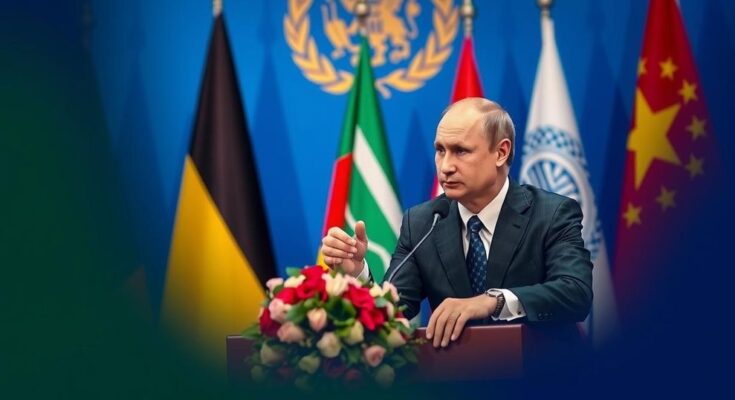President Vladimir Putin is hosting the Brics summit in Kazan to showcase Russia’s resilience against Western sanctions and to foster alliances with emerging economies. The summit will gather significant leaders from countries such as China and India, despite inherent differences within Brics. Putin aims to discuss creating alternative trade mechanisms that bypass the US dollar, reinforcing Russia’s position in the global economic landscape.
In an effort to counteract the isolation imposed by Western nations following his actions in Ukraine, President Vladimir Putin is hosting the Brics summit in Kazan, gathering over 20 heads of state from emerging economies. Among those attending are notable leaders such as Xi Jinping of China, Narendra Modi of India, and Iran’s Masoud Pezeshkian. This summit has been characterized by the Kremlin as one of the most significant foreign policy events in Russian history, aimed at demonstrating that efforts to isolate Russia have failed. Chris Weafer, a partner at Macro-Advisory, commented, “The clear message is that attempts to isolate Russia have failed. It’s a big part of the messaging from the Kremlin that Russia is withstanding sanctions.” The Brics group, originally comprising Brazil, Russia, India, China, and South Africa, has expanded to include countries such as Egypt, Ethiopia, Iran, and the UAE, with Saudi Arabia showing interest in joining. Collectively, these nations account for 45% of the global population and represent approximately 28% of the world’s economic output. Russian officials have indicated that an additional 30 countries are interested in aligning with Brics. Despite the summit’s positive optics for Russia, challenges remain. Putin’s objectives include urging Brics members to develop an alternative trade mechanism that bypasses the US dollar, which has been a significant barrier due to the constraints of Western sanctions. Mr. Weafer noted, “A lot of the problems Russia’s economy is facing are linked to cross-border trade and payments. Russia’s main interest is in breaking the dominance of the US dollar.” However, the heterogeneous nature of Brics presents difficulties. There are intrinsic disagreements, most notably between China and India, whose mutual distrust undermines potential cooperation. Jim O’Neill, former Chief Economist at Goldman Sachs, remarked, “In some ways it’s a good job for the West that China and India can never agree about anything.” In addition to the Chinese-Indian tensions, there are disputes between Egypt and Ethiopia, as well as ongoing rivalry between Iran and Saudi Arabia. The variability in agendas among member states raises skepticism about achieving substantive agreements. O’Neill expressed doubt about the likelihood of significant consensus, stating, “The idea that they’re all going to fundamentally agree on something of great substance is bonkers really.” As President Putin convenes this gathering, he aims to project an image of solidarity within the Brics framework while demonstrating that Russia remains a pivotal player on the international stage, despite widespread sanctions. The summit will be a crucial moment for Russia to showcase its alliances and counter narratives of isolation.
The Brics summit, which will be held in Kazan, is significant for President Putin as it serves as a platform to illustrate Russia’s connections with emerging economies amidst international sanctions and diplomatic pressure. Following Russia’s invasion of Ukraine, Western nations have targeted the country with sanctions aiming to cripple its economy. The summit not only reinforces Putin’s attempt to solidify alliances but also seeks to challenge the dominance of the G7 nations by highlighting the collective economic might of Brics countries. Additionally, the summit’s attendance list features various leaders from countries traditionally not aligned with the West, suggesting potential shifts in global geopolitical dynamics.
The Brics summit presents a strategic opportunity for President Putin to display Russia’s resilience against Western sanctions while fostering ties with emerging economies. Despite the inherent differences among member states, the assembly serves as a testament to Russia’s alliances and its aspiration to create alternative financial mechanisms that could insulate its economy from Western influence. Ultimately, the summit reflects a significant moment in the dialogue surrounding global economic power and geopolitical alignment, underscoring the complexities of international relations within Brics.
Original Source: www.bbc.com




